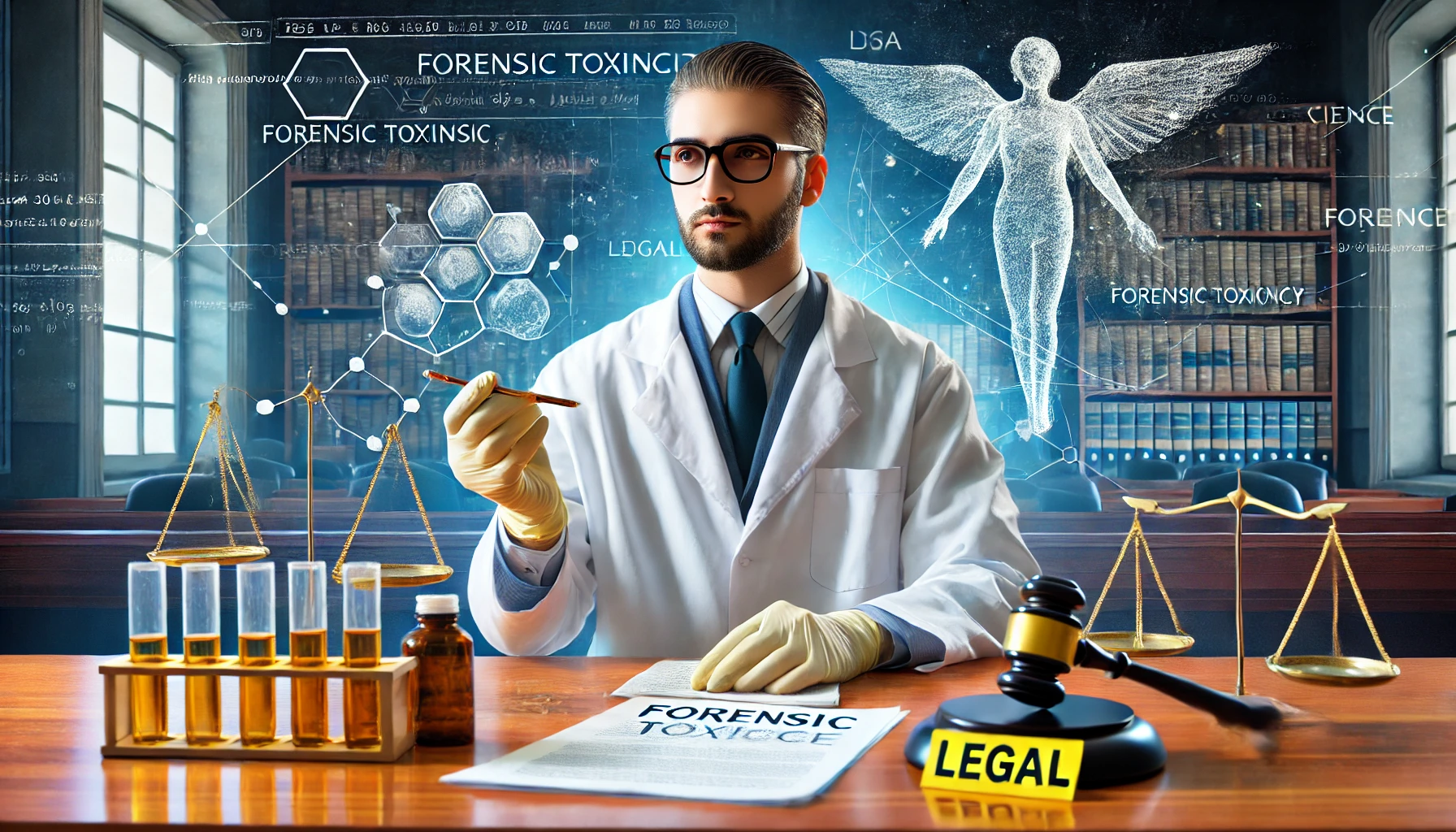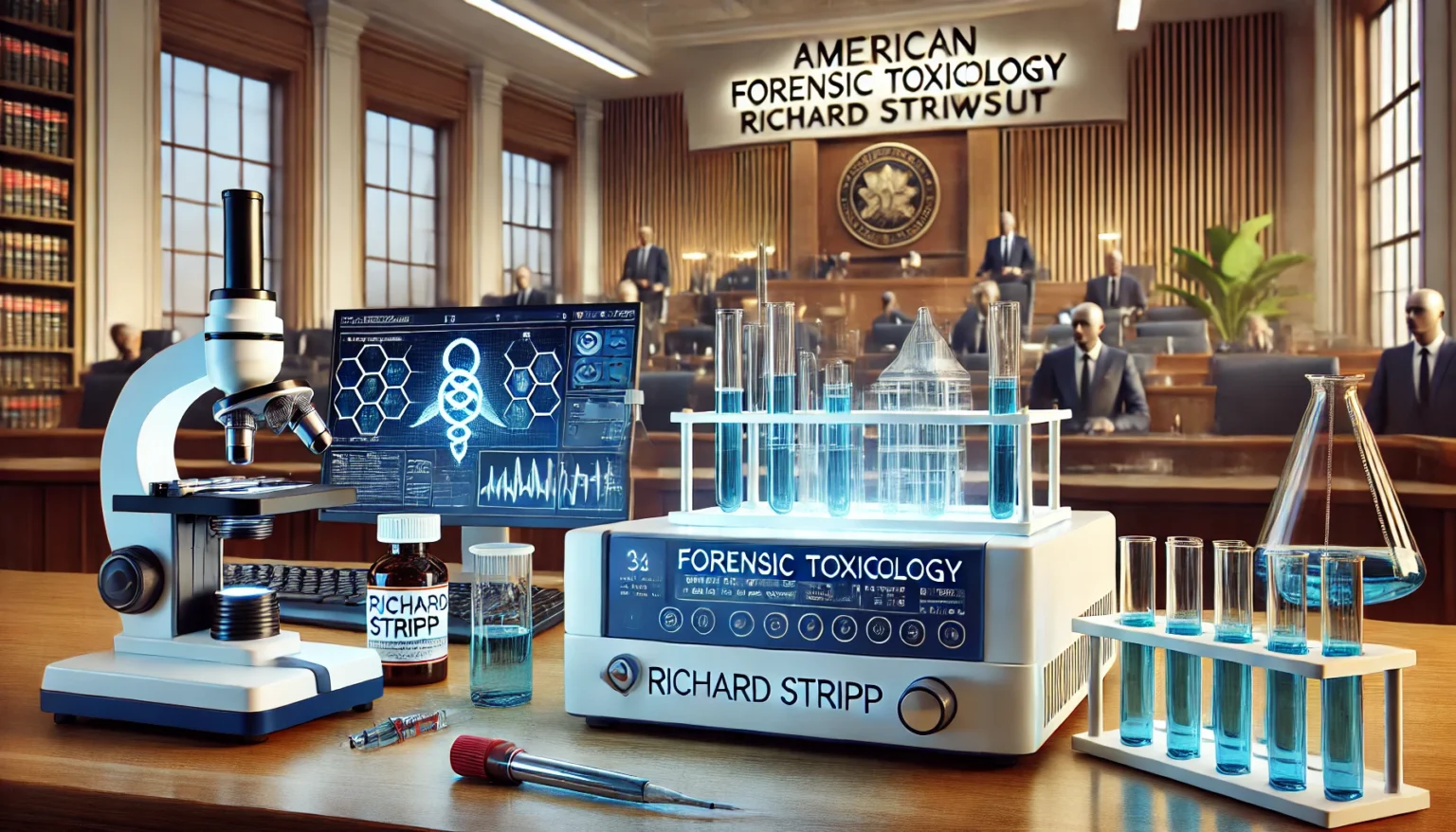The field of forensic toxicology plays a critical role in the justice system by analyzing biological samples to detect drugs, alcohol, and other substances. However, legal disputes can often emerge within this specialized area, as highlighted by the American forensic toxicology Richard Stripp lawsuit.
Richard Stripp, a prominent figure in forensic toxicology, has been at the center of significant contributions and controversies. The lawsuit involving him sheds light on the challenges professionals face in maintaining ethical and scientific integrity.
The American forensic toxicology Richard Stripp lawsuit has broader implications, raising questions about professional standards, legal accountability, and the evolving landscape of forensic science. Understanding this case provides valuable insights into the intersection of law and forensic practices.
The Role of Richard Stripp in the Field
Richard Stripp is a renowned expert in forensic toxicology, contributing extensively to the analysis and interpretation of toxicological evidence. His work involves identifying substances in biological specimens to aid investigations.
As a practitioner, Stripp has set benchmarks in applying toxicological expertise in legal cases, particularly in understanding substance-related crimes and deaths. His scientific approach combines accuracy and ethical compliance.
Stripp’s leadership in the field extends to mentoring young professionals and advocating for rigorous scientific practices. His career underscores the importance of reliability and impartiality in forensic science.
The American forensic toxicology Richard Stripp lawsuit, however, introduced legal complexities that highlighted challenges faced by professionals in maintaining a balance between scientific rigor and legal scrutiny.
Stripp’s influence extends globally, where his methodologies have been referenced in research and professional training, contributing significantly to the evolution of forensic toxicology.
Key Contributions of Richard Stripp to Forensic Science
American Forensic Toxicology Richard Stripp Lawsuit has developed innovative techniques for detecting and analyzing drugs in complex biological samples. His research focuses on enhancing sensitivity and accuracy in forensic toxicology.
One of his notable contributions is in the interpretation of toxicological findings, aiding law enforcement and judicial systems in making informed decisions. His insights are often sought in high-profile cases.
Stripp’s advocacy for education has resulted in numerous workshops and training programs, ensuring professionals understand the ethical dimensions of toxicology.
Key Achievements Table
| Contribution | Impact on Forensic Science |
| Advanced drug detection methods | Improved accuracy in forensic investigations |
| Research publications | Established new benchmarks in toxicological studies |
| Training and mentorship | Cultivated the next generation of toxicologists |
The American forensic toxicology Richard Stripp lawsuit may have overshadowed some of his achievements, but it also highlighted the necessity for stringent protocols and transparency.
Stripp’s lifelong dedication has not only advanced the field but also reinforced the credibility of forensic evidence in judicial proceedings.
Examining the American Forensic Toxicology Richard Stripp Lawsuit
The American forensic toxicology Richard Stripp lawsuit brought attention to legal accountability in the field of forensic science. The case stemmed from allegations concerning professional practices and their implications.
This lawsuit underscores the complex nature of forensic toxicology, where even the slightest misstep can lead to legal disputes. It raised critical questions about the standards of evidence presentation and interpretation.
Bullet Points:
- Key Issues: Professional conduct, evidence reliability, and legal obligations.
- Impact: Tarnished reputations and a reevaluation of ethical standards.
- Lessons: Highlighted the need for clear protocols and independent reviews.
The lawsuit also initiated discussions about the role of regulatory bodies in monitoring forensic toxicology practices. Stripp’s involvement brought both criticism and support, reflecting the polarized views within the scientific community.
Ultimately, the case served as a reminder of the importance of maintaining transparency, accountability, and adherence to legal frameworks in forensic toxicology.
Legal Challenges in the Forensic Toxicology Sector
The forensic toxicology field faces numerous legal challenges, including maintaining the admissibility of evidence in court and upholding ethical standards during investigations.
Cases like the American forensic toxicology Richard Stripp lawsuit highlight the scrutiny that forensic toxicologists encounter, particularly when their findings are contested.
Shortcomings in methodologies, interpretation errors, and biased reporting often lead to legal disputes.
Chart: Legal Challenges and Their Impacts
| Legal Challenge | Impact on Forensic Toxicology |
| Evidence admissibility | Delays and complications in legal proceedings |
| Ethical violations | Damage to professional credibility and trust |
| Methodological inconsistencies | Questions on the reliability of toxicological reports |
The lawsuit also reveals the pressure forensic toxicologists face when their findings determine critical outcomes in criminal and civil cases. Balancing scientific integrity with legal expectations remains a persistent challenge.
Future advancements in forensic toxicology must focus on improving technology, fostering ethical compliance, and creating robust systems to minimize legal conflicts.
How the American Forensic Toxicology Richard Stripp Lawsuit Impacts the Field
The American forensic toxicology Richard Stripp lawsuit has significantly influenced the field by highlighting the need for transparency and accountability. This case has prompted many professionals to reevaluate their practices to avoid potential legal pitfalls.
One major impact is the increased scrutiny on forensic toxicology methods. Courts and regulatory bodies now demand stricter adherence to validated procedures and protocols to ensure evidence integrity.
The lawsuit has also sparked discussions about expert witness credibility. It underscores the importance of presenting unbiased, scientifically sound findings during legal proceedings.
Key Impacts of the Lawsuit (Bullet Points):
- Enhanced focus on professional conduct and ethics.
- Broader discussions on evidence reliability and admissibility.
- Push for improved training and certifications for forensic toxicologists.
Moreover, this case has drawn attention to gaps in regulatory oversight. Policymakers are now advocating for updated standards to minimize errors and ensure consistent practices across the profession.
The long-term effect of the lawsuit is likely to be an industry-wide shift towards better training, stricter guidelines, and greater transparency in forensic toxicology.
Ethical Considerations in Forensic Toxicology Disputes
Ethical issues are at the core of disputes in forensic toxicology, as seen in the American forensic toxicology Richard Stripp lawsuit. These disputes often arise from conflicting interests, improper reporting, or biased testimony.
Maintaining objectivity is a significant ethical challenge. Toxicologists must avoid any pressure to tailor findings to suit legal outcomes, which can compromise their scientific integrity.
The use of unreliable methods or outdated technologies can also raise ethical concerns. Ensuring the accuracy and reliability of toxicological evidence is a fundamental professional responsibility.
Ethical Concerns in Forensic Toxicology (Table):
| Ethical Concern | Impact on Cases |
| Bias in reporting | Misleading evidence affecting case outcomes |
| Lack of transparency | Reduced trust in forensic findings |
| Inadequate documentation | Challenges in verifying toxicological results |
Ethical training and adherence to professional codes of conduct can help address these concerns. Toxicologists must also remain vigilant against external pressures that could influence their work.
Ultimately, disputes such as the American forensic toxicology Richard Stripp lawsuit highlight the need for a robust ethical framework to ensure justice and uphold the profession’s credibility.
Professional Standards in American Forensic Toxicology
The field of forensic toxicology operates within strict professional standards to ensure reliability and credibility in legal proceedings. These standards are vital to maintaining trust in toxicological evidence.
Core professional standards include rigorous validation of methods, accurate documentation of procedures, and continuous education to stay updated with advancements in the field.
The American forensic toxicology Richard Stripp lawsuit emphasized the importance of adhering to these standards. Legal disputes often arise when professionals fail to meet expected benchmarks, compromising the evidence’s integrity.
Professional Standards:
- Validation of Methods: Ensures scientific accuracy.
- Training and Certification: Promotes expertise among toxicologists.
- Transparency and Documentation: Provides verifiable evidence for courts.
Organizations like the American Board of Forensic Toxicology (ABFT) play a key role in establishing these standards. They provide certifications that reflect a toxicologist’s commitment to excellence.
By adhering to professional standards, toxicologists can enhance their credibility, minimize errors, and contribute effectively to the justice system.
A Closer Look at the Richard Stripp Lawsuit
The American forensic toxicology Richard Stripp lawsuit involved allegations that questioned both the professional practices and ethical responsibilities of Richard Stripp. This case serves as a pivotal moment in understanding the complexities of forensic toxicology disputes.
The lawsuit highlighted key issues such as the admissibility of evidence, the accuracy of toxicological findings, and the ethical responsibilities of expert witnesses. These aspects are central to maintaining trust in forensic science.
Timeline of the Lawsuit (Table):
| Event | Description |
| Allegations Raised | Initial claims questioned professional practices. |
| Court Proceedings Initiated | Legal scrutiny on toxicological methods began. |
| Community Response | Divided opinions among forensic professionals. |
| Impacts on Policies | Calls for stricter standards and better oversight. |
The case has fueled discussions on how forensic toxicologists should present findings in court. Transparency, accuracy, and impartiality are now emphasized more than ever.
Ultimately, the lawsuit underscores the critical role of regulatory oversight and professional accountability in safeguarding the integrity of forensic toxicology.
Broader Implications of Lawsuits in Forensic Science
Lawsuits in forensic science, such as the American forensic toxicology Richard Stripp lawsuit, underscore the profound impact legal disputes can have on the discipline. They highlight vulnerabilities in methods, reporting, and professional ethics.
One major implication is the increased scrutiny on forensic evidence in courtrooms. Legal challenges compel forensic scientists to maintain high standards in methodology and documentation to ensure evidence admissibility.
Such lawsuits also drive the development of stricter regulations and oversight. Policymakers and industry bodies often respond by establishing enhanced guidelines to prevent similar disputes in the future.
Broader Implications (Bullet Points):
- Emphasis on scientific rigor and reliability of evidence.
- Push for improved training and certification.
- Development of clear ethical standards for forensic professionals.
These disputes can also damage public trust in forensic science, raising concerns about bias, inaccuracies, or misconduct. However, they also provide opportunities to address systemic issues and improve the field.
In the long term, lawsuits serve as a catalyst for refining forensic practices, ensuring justice, and reinforcing the credibility of forensic experts.
Public Perception of Legal Disputes in Forensic Toxicology
Public perception of legal disputes, like the American forensic toxicology Richard Stripp lawsuit, often influences trust in forensic science. High-profile cases can lead to skepticism about the reliability of toxicological evidence.
Sensationalized reporting can amplify doubts about forensic practices, even when issues are isolated incidents rather than systemic problems.
Public mistrust may stem from the belief that forensic experts can be biased or pressured by legal teams. This highlights the need for transparency in how evidence is collected, analyzed, and presented.
Educational initiatives are crucial for addressing misconceptions. By explaining the scientific principles and limitations of forensic toxicology, professionals can help rebuild confidence.
Ultimately, disputes like the American forensic toxicology Richard Stripp lawsuit underscore the importance of fostering public understanding of forensic science to maintain its role in delivering justice.
The Impact of the American Forensic Toxicology Richard Stripp Lawsuit on Policy
The American forensic toxicology Richard Stripp lawsuit has had a significant impact on policies governing forensic toxicology. It underscored gaps in regulatory frameworks that required immediate attention.
One key outcome has been a push for stricter protocols in toxicology testing and evidence interpretation. Legal disputes have highlighted the need for validated methods and consistent reporting standards.
Policy Changes Table:
| Policy Area | Changes Initiated |
| Method Validation | Implementation of stricter testing protocols. |
| Expert Testimony Standards | Enhanced training for court presentations. |
| Regulatory Oversight | Establishment of clearer accountability measures. |
The case also highlighted the importance of independent review mechanisms to ensure the credibility of forensic evidence. Many agencies now prioritize audits and peer reviews to minimize errors.
Moving forward, the influence of this lawsuit is likely to shape policies aimed at improving the reliability, transparency, and accountability of forensic toxicology practices.
The Future of Forensic Toxicology Amid Legal Challenges
The American forensic toxicology Richard Stripp lawsuit serves as a reminder of the legal challenges that forensic toxicology professionals face. These challenges will shape the future direction of the field.
Emerging technologies, such as advanced mass spectrometry and AI-based analysis, offer opportunities to enhance accuracy and reduce errors in toxicological testing. However, they also raise new questions about validation and admissibility in court.
Legal disputes emphasize the need for a balance between technological advancement and ethical compliance. Professionals must adapt to new tools while ensuring adherence to established standards.
Future Trends (Bullet Points):
- Integration of AI and machine learning for data analysis.
- Continued emphasis on training and certification.
- Development of universal guidelines for toxicological evidence.
Collaboration between forensic scientists, policymakers, and legal professionals will be crucial to addressing these challenges. Clear communication and shared goals can ensure that legal challenges are met with proactive solutions.
The future of forensic toxicology depends on its ability to evolve while maintaining scientific rigor and public trust, despite ongoing legal and ethical challenges.
Conclusion
The American forensic toxicology Richard Stripp lawsuit highlights the intricate relationship between forensic science and the legal system. It underscores the importance of maintaining transparency, scientific rigor, and ethical compliance in forensic toxicology to ensure justice is served effectively.
This case has brought critical attention to the need for improved methodologies, stricter regulatory oversight, and clearer professional standards. By addressing these areas, the field can minimize disputes and reinforce the credibility of toxicological evidence in legal proceedings.
Furthermore, the lawsuit serves as a reminder of the challenges faced by forensic professionals in balancing scientific objectivity with the demands of the courtroom. Continuous education, technological advancements, and adherence to ethical principles will be vital in overcoming these challenges.




